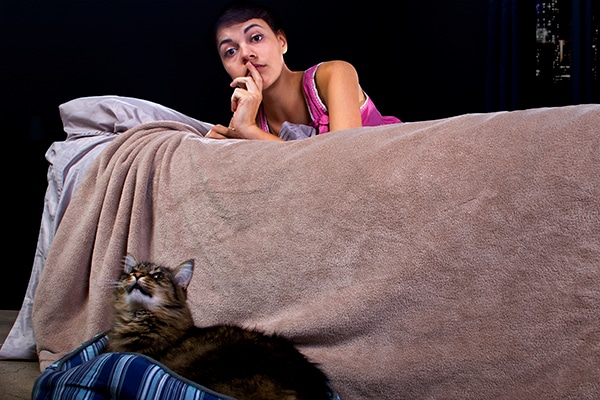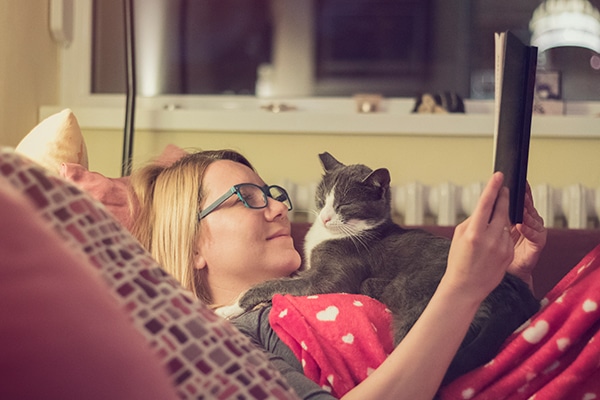It’s after midnight, and you wake up to your cat meowing. This scenario presents a couple of complications: 1) your cat’s indicating she has needs that aren’t being met and 2) you’re losing precious sleep. What to do? Thankfully, there are a few possible solutions, but let’s first look at some reasons for cat meowing at night.
Why is your cat meowing at night?

Cats are known to sleep for extended periods of time but can be active when they’re not sawing logs. If your cat vocalizes at night while you’re sleeping, consider these reasons for your cat meowing at night.
- Changing residences can cause anxiety, which may present itself as a cat whining or a cat meowing at night.
- Kitty is bored and wants you to wake up and play with her.
- Hunger or thirst are afoot, and your cat is sounding the alarm.
- An older cat may be experiencing dementia and her meows are based in confusion.
- There’s a health-related cause for your cat meowing at night.
- A newly adopted kitten might feel scared in her new environment.
- A newly adopted older cat may feel lonely because she’s used to the company of other cats at the shelter — especially if she had bonded with a particular friend.
- Something she sees outside — likely another cat — disturbed her.
How to stop cat meowing at night
As you can see, there are many reasons for a cat meowing at night. But, thankfully, getting shut-eye might be easier than you think. Here are some ways to stop a cat meowing at night:
- Visit a veterinary professional to rule out any medical reasons that could be behind a cat meowing at night. As cats age, they’re prone to developing thyroid or kidney diseases, which might result in meowing a lot.
- Because moving can be an exceptionally stressful time for pets, Brent Bilhartz of LazyPaw Animal Hospitals says, “Moving tends to throw daily schedules upside down, but keep your pet’s routine as similar to normal as possible. Stick with feeding schedules, and make time for play and affection. Even a few minutes every day can make your pet feel safe, loved and calm.” A cat who feels safe and secure is less likely to anxiously meow at night.
- If cats aren’t active during the day, they might want to burn off that energy at night. One way to help the burn — and your likelihood of a good night’s sleep — is to give kitty a good workout before bed. Using wand toys that make her jump or playing chase with a ball are excellent ways to release some of the cat zoomies that are keeping you awake.
- It’s also a good idea to feed your cat and provide fresh water right before you go to bed. Even humans sleep well with a full belly!
- Cats who suffer from anxiety may need extra assurance and attention from you, especially at bedtime. Bring your cat into the bedroom with you, and even move her bed near yours. Some cats like having a blanket or towel on their human’s bed — oftentimes they like to sleep right next to their person. Showing extra comfort and security can help an anxious or confused cat feel more relaxed and less likely to meow.
- Newly adopted kittens may meow out of loneliness. Again, playtime before bed is a way to let the baby burn off energy and also bond with you. If you’re up for it, take the kitten to bed with you at night. The comfort of sleeping with you might calm her down and give you a fighting chance at sleep. Remember, though, a new kitten is a baby, and it may take a few nights for her to settle into her new routine and surroundings.
- If you find the meowing directed at activity happening outside the house, simply closing the blinds or curtains might be an easy solution.
The bottom line on what to do about a cat meowing at night
It is possible to get a good night’s sleep when you share your home with a vocal cat. If you’ve tried our suggestions and are still losing sleep due to a cat meowing at night, it’s best to follow up with your vet and perhaps consult a behaviorist.
Thumbnail: Photography ©IvanJekic | E+ / Getty Images.
Got your cat to stop meowing but still can’t get a good night’s sleep? Check out remedies for sleep disorders right here >>
Read more about cats and sleep on Catster.com:





